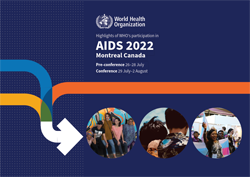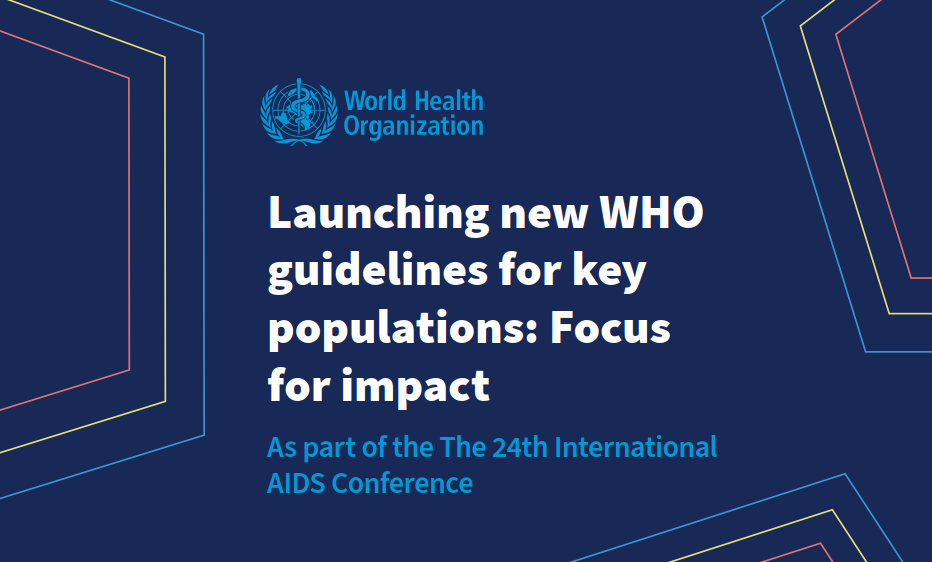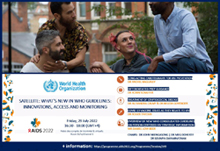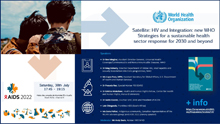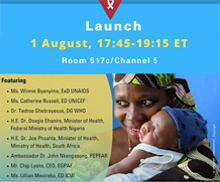WHO will participate in AIDS 2022, the 24th International AIDS Conference which will take place both in Montreal, Canada and virtually. WHO Department of Global HIV, hepatitis and sexually transmitted infections Programmes (HHS) will hold a number of key plenary and satellite sessions to present new guidelines, introduce the new Global Health Sector Strategies on, respectively, HIV, viral hepatitis and sexually transmitted infections for the period 2022-2030, launch a new joint UNICEF-UNAIDS-WHO initiative on to end AIDS in children, and to share its latest scientific and normative work.
Dates and times
Pre-conference: 26–28 July
Conference: 29 July–2 August
All times are in Eastern Daylight Time (EDT).
Agenda
Thursday, 28 July 2022
Official AIDS 2022 press conference
10:00–11:00
WHO will present its new guidelines for the use of long-acting injectable cabotegravir (CAB-LA) as pre-exposure prophylaxis (PrEP) for HIV prevention.
Friday, 29 July 2022
Opening press conference
08:00–09:00
WHO satellite: Launching new WHO guidelines for key populations: Focus for impact
14:45–16:15, satellite, room 517d/Channel 2
Presentation and panel to launch the updated WHO consolidated guidelines on HIV, hepatitis and STIs prevention, diagnosis, treatment and care for key populations, 2022.
Online programme | Download flyer (PDF, 40 kB)
Accelerating investigation of novel therapeutics in pregnancy: from theory to action
14:45–16:15, satellite, room 516/Channel 6
The aim of the Satellite is to launch the JIAS supplement on Approaches to enhance and accelerate investigation of new HIV drugs in pregnancy, discuss the strategic actions required and explore the application of this work to HIV related co-infections. The Satellite will be a combination of engaging panels with a diverse range of key stakeholders that will 1) focus on actions to effectively implement the proposed framework, 2) highlight the voices of community members who will discuss the effective and meaningful support of participants in research and 3) explore application of the proposed framework to other disease areas (STIs, viral hepatitis, malaria and TB).
Self-testing to enhance HIV, Hepatitis C and Covid-19 diagnosis and integrated, differentiated service delivery
14:45–16:15, satellite, room 518/Channel 10
Reflecting on the levers that have contributed to the HIVST market growth and discussing how the evidence from supply and demand side interventions can be applied to self-care and self-testing approaches in other disease areas and present preliminary results from use cases for Covid-19 and Hepatitis C self-testing.
WHO satellite: What's new in WHO guidelines: innovations, access and monitoring
16:30–18:30, satellite, room 517a/Channel 3
This session will present the new WHO guidelines focusing on innovations, access and person-centered monitoring. This will include sharing new recommendations on injectable PrEP, innovations in treatment of cryptococcal disease and digital health innovations.
Online programme | Download flyer (PDF, 40 kB)
Saturday, 30 July 2022
Expanding access to PrEP through differentiated service delivery: Lessons from COVID-19 adaptations
08:00–09:00, satellite, room 517c/Channel 5
This session will convene implementers, advocates, policy makers and researchers to share their differentiated PrEP service delivery experiences towards increasing PrEP uptake, continuation, and effective use, as well as to ensure PrEP programme resilience going forward.
Stretching the dollar: Developments in lower-cost methods for estimating key population size and measuring service coverage
11:00–12:30, workshop, room 524/Channel 9
Science workshop: This workshop, designed by FHI 360, UNAIDS, WHO, the Global Fund, CDC and USAID, will increase participants' knowledge of new simpler and cheaper approaches for conducting key population size estimates, assessing the reach and impact of key population programmes, and supporting surveillance for HIV and other STIs among key populations.
Launch of the policy brief on virtual interventions
14:00–15:00, launch, UNAIDS meeting room
This event is planned to launch the policy brief on virtual interventions in the presence of community members, ministry stakeholders, development partners, UN partners, CSOs, CBOs.
Meeting with partners to discuss key populations guidelines dissemination
15:30–17:00, meeting, UNAIDS meeting room
This side-meeting is an opportunity to discuss dissemination plans with global partners, inclulding UN agencies, donors and key populations networks.
WHO satellite: HIV and Integration: new WHO Strategies for a sustainable health sector response for 2030 and beyond
17:45–19:15, satellite, room 517a/Channel 3
Noting that more than 1 million people are newly infected with HIV, viral hepatitis, and sexually transmitted infections every day, resulting in 2.3 million deaths collectively and 1.2 million cases of cancer each year, the World Health Assembly mandated WHO to take forward Global Health Sector Strategies on, respectively HIV, viral hepatitis and sexually transmitted infections for the period 2022-2030 at its 75th meeting in May 2022. The satellite will be live and in-person and will be organized around the 5 strategic directions of the new strategies to hear diverse stakeholder perspectives on implementation opportunities and challenges now the strategies have been approved – recognizing there is no time to lose in getting stalled responses back on track.
Online programme | Download flyer (PDF, 1470 kB)
Expanding COVID-19 Vaccine Access and Coverage for People Living with HIV and Key Populations
17:45–19:15, satellite, room 517c/Channel 5
As COVID-19 vaccine availability improves in low- and middle-income countries, there is an urgent need to identify and rapidly scale up strategies that optimize vaccine access and uptake among vulnerable populations, including people living with HIV (PLHIV) and members of key populations most affected by HIV. This session will share the latest evidence on safety and effectiveness of COVID-19 vaccines for PLHIV, including dosage and booster recommendations; explore barriers to more equitable vaccine access and uptake among PLHIV and key populations; and highlight locally-led vaccine rollout approaches that leverage lessons from the global HIV response and the existing HIV program infrastructure to effectively accelerate COVID-19 vaccine coverage among PLHIV and key populations.
Sunday, 31 July 2022
Monkeypox media roundtable
11:30–12:30
Community discussion on WHO updated key populations guidelines
15:30–16:30, community session, Community Networking Zone
The Power of Partnerships: Placing communities at the center of global decision making and planning
17:45–19:15, satellite, Global Village Networking Zone
The past 5 years have seen historic success in global HIV treatment optimization. Central to these efforts has been the voice of communities of people living with HIV whose engagement and leadership has defined global and national programmatic responses. In 2016, the Clinton Health Access Initiative (CHAI), AfroCAB and Unitaid established the Optimal Community Advisory Board (CAB) to elevate the community perspective in policy planning and foster demand generation for optimal products. Through this work, community leaders have helped shape HIV policies and implementation around the world and contributed to the remarkable scale up of DTG-based regimens. Based on the Optimal CAB's work, this networking zone aims to share best practices for stakeholder engagement and community collaboration through the distribution of literacy materials, briefs and case studies and by hosting several speaking and skills-building sessions.
Monday, 1 August 2022
What the HIV Movement Brings to Pandemic Prevention, Preparedness, and Response
08:00–09:00, Satellite, Room 518/Channel 10
This event will highlight the critical role that the HIV movement has played in responding to the COVID pandemic in key affected regions and in fighting for access to vaccines. Panellists will examine how we can ensure a strong voice for the HIV/AIDS movement in discussions on what governance and financing architecture for PPR should look like. It will also explore opportunities and challenges that the PPR agenda poses for our shared goal of ending AIDS and promote a shared understanding across global and national CSOs and HIV funders of the growing global focus on pandemic preparedness and response.
WHO symposium: Monkeypox: Outbreak and response in non-endemic countries
10:30–11:30, symposium, Room 220 d/e/Channel 1
This session aims to touch on the history of monkeypox while focusing on the epidemiology of the current outbreak in non-endemic countries. The discussion will present the clinical syndrome and treatment for monkeypox, searching for solutions through public health management and vaccines. Stigma and discrimination linked to people diagnosed with monkeypox has also been raising concern around the world. The session will question and address stigma and discrimination with proposed community messaging and health campaigns.
WHO session: Health equity for all
13:00–14:00, special session, Room 220 d/e/Channel 1
Keynote speech by WHO Director-General Dr Tedros Adhanom Ghebreyesus
This session will focus on equity: equitable access to services and medicines, and equitable access to vaccines. To attain equity, we need systems for delivery and we need political will. This session investigates the role of international cooperation mechanisms and how these can help muster the political will we need to overcome entrenched systems that benefit a few to the detriment of the majority. During the COVID-19 pandemic, systems to distribute vaccines equitably were put in place quickly. But these systems failed to deliver due to nationalistic policies. What could countries do differently in the future? How much hope can we put in new production capacity for vaccines and other medicines in resource-limited settings? How can we ensure voluntary licensing and affordable pricing of new drugs? The panel discussion will raise questions around how communities see UHC and integration: a road towards better access or a threat to the successes achieved through disease-specific approaches? Panellists will address the ways in which the international system may better support in-country advocacy for equity.
WHO satellite: Launch of the Global Alliance Initiative to end AIDS in children by 2030: Building partnerships, communities and innovation
17:45–19:15, satellite symposium, room 517c/Channel 5
In this Satellite Session, we would introduce and launch The Global Alliance to end AIDS in children, a Global Strategic Initiative to end AIDS in children by 2030. Specific objectives of this Satellite Session are to: 1. To present the 'Global Alliance' to national governments, funders, implementing partners and regional and country-based organizations, community-led organizations, faith communities and organizations, and civil society networks including of women and youth living with HIV; 2. To discuss the Alliance's organization, stakeholder contributions, structure, objectives and expected key outcomes; 3. To deliberate on the way forward for the prioritized interventions; 4. To launch the Alliance.
Online programme | Download flyer (PDF, 620 kB)
Tuesday, 2 August 2022
Self-testing and self-sampling to enhance integrated HIV, STIs and hepatitis services
14:15–15:15, symposium, room 220 d/e/Channel 1
This session will provide up-to-date science around self-testing and self-sampling technologies for HIV, STIs and hepatitis and discuss how self-testing and self-sampling guidelines could be translated into actual implementation at scale.

